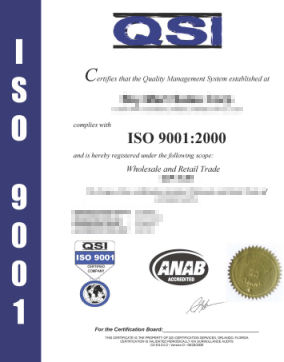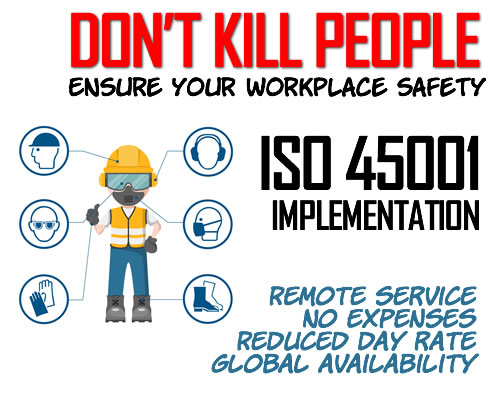Orlando FL – ISO 9001 certification body QSI Auditing and Certification Services LLC continues to market ANAB accreditation on its website, despite a ruling by the ANSI-ASQ National Accreditation Board (ANAB) that de-listed the registrar from accreditation, preventing it from issuing ANAB-marked ISO 9001 certificates.
ANAB and other international accreditation bodies authorize organizations such as QSI to conduct ISO 9001 and other management system audits by auditing them against ISO 17021, a standard intended to ensure the validity of resulting certificates. The ISO 17021 standard — which includes much of ISO 9001, as well as additional requirements — focuses on limiting conflicts of interest, ensuring registrars follow internationally accepted guidelines on conducting audits, implement their own quality management system, and have a system in place for processing customer complaints.
According to one online article on the subject, “Effective 15 September 2008, ANAB has withdrawn accreditation of QSI America, Inc. for certification of QMS. QSI America, Inc. is no longer authorized to issue any new ANAB accredited certificates, and must withdrawal all ANAB accredited certificates that were issued prior to 15 September 2008.” This is supported by a similar statement on the ANAB home page.
Regardless, as of September 2, 2009 QSI America maintains a listing of its registered clients between 2001 through 2008 that lists ANAB as the accrediting body, and which includes a graphic of the ANAB logo at the page’s header.
The reasons for ANAB’s de-accreditation of QSI America are not publicly known. Typically, certification bodies (also called “registrars”) are de-accredited due to conflicts of interest (combining training and certification services), failure to respond to ANAB audit findings, or administrative snafus.
The usage of ANAB’s logo could spell additional trouble for the Orlando based QSI, as ANAB recently won a long-running court case against American Global Standards for improper usage of the ANAB logo on nearly 100 Japanese ISO 9001 certificates. The listing on the QSI website totals 235 companies, in countries such as Costa Rica, India, Nepal and the US.
Below is an example of one US company (name redacted) which had its QSI certificate posted on its website, clearly showing the ANAB mark and indicating it had been issued by QSI in January 2007 , with an expiration date of 2010. This could support a claim that QSI has failed to recall ANAB marked certificates and notify their clients to stop using them, as mandated by the rules governing de-accreditation.

In addition, QSI indicates it is accredited by three other accreditation bodies. The first, the International Accreditation Registry (IAR) is not a signatory to the International Accreditation Forum (IAF) multilateral agreement, to which ANAB and some other accrediting bodies are signed. IAR boasts its status as a “stand alone organization”, a possible attempt to market its lack of MLA status as a benefit. IAF MLA signatory status ensures accrediting bodies themselves follow established rules, to ensure the validity of their assessments of registrars.
The second, EMA of Mexico, does not list QSI as a certified body on its website directory, but does list QSI on an internal document as of February 2009. EMA is a signatory to IAF.
The final body is the National Accreditation Board for Certification Bodies (NABCB) in India, which lists QSI (India) Certifications Pvt. Ltd. as an accredited registrar, not QSI Auditing and Certifications Services LLC. Florida state records show that QSI-ACS is a standalone company, registered as an LLC in Florida state, and not an entity under the Indian QSI organization. This is confirmed by language on the QSI website itself, which reads, “QSI refers to QSI America, Inc, a Florida Corporation and its global network or of Business Partners, each of which is a separate and independent legal entity.” This would seem to confirm that the two companies are separate, potentially making QSI’s current usage of the NABCB logo on QSI-ACS certificates improper, as it may refer to the wrong entity. NABCB is an IAF MLA signatory. Oxebridge is contacting NABCB at press time to confirm this.
Oxebridge continues to monitor certification body compliance to international rules, as a means of ensuring the value and validity of international ISO 9001 and AS9100 certifications for users of those standards.
Christopher Paris is the founder and VP Operations of Oxebridge. He has over 35 years’ experience implementing ISO 9001 and AS9100 systems, and helps establish certification and accreditation bodies with the ISO 17000 series. He is a vocal advocate for the development and use of standards from the point of view of actual users. He is the writer and artist of THE AUDITOR comic strip, and is currently writing the DR. CUBA pulp novel series. Visit www.drcuba.world









